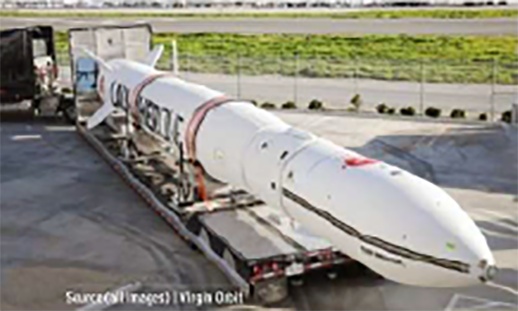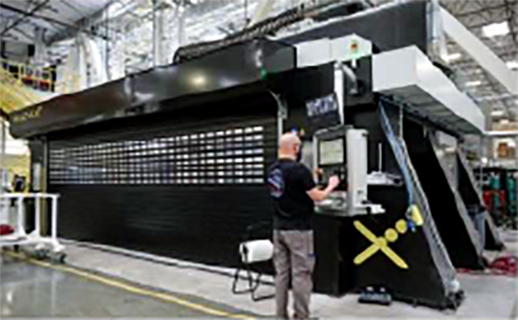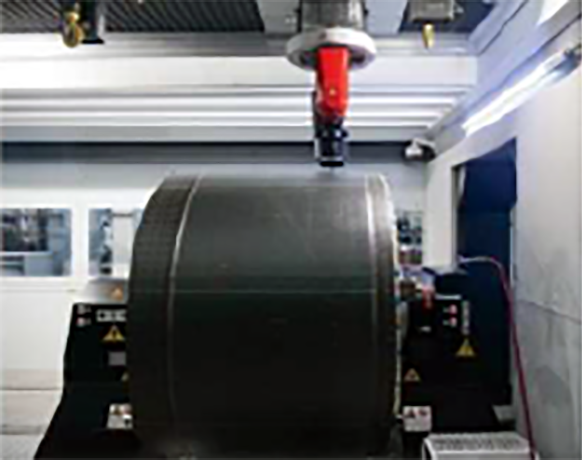
Virgin Orbit automates composites machining processes of LauncherOne Rockets
Part of the company’s larger strategy for reducing cycle times and labor costs on its composite-intensive rockets, a customized machine center from Multiax America solves composite machining challenges.



>> Satelite launch company Virgin Orbit (Long Beach, Calif., US) successfully launched its first CubeSat deployer rocket, LauncherOne, into orbit in January 2021 carrying 10 payloadsfor NASA’s Launch Service Program (LSP), LauncherOne, which is deployed via Virgin Orbit’s Cosmic girl customized linerless, filament-wound composite propellant tanks.
Following this successful flight, this company is looking to begin ramping up manufacturing operations for LauncherOne Satelite deployers at Virgin Orbit’s Long Beach design and manufacturing facility, says Alan Wax machine shop supervisor at Virgin Orbit. As almost all rockets’ components are fabricated and machined in-house, one way the company has been preparing for higher-volume manufacture has been via upgrades to its dedicated on-site machine shop. For example, in January 2021 Virgin Orbit finished installation of a customized Multiax America (Grandville, MI, USA) machining center to replace hand trimming and drilling on the LauncherOne’s exterior fuselage panels.
“The Virgin Orbit goal is to provide low-cost ride to space,” Wax explains. “The way to do that is a) look at labor costs and b) look at how to automate repetative processes. The rocket industry is typically infamous for customizing each rocket, for changing things each time they fly. There will be room for iterations and learning and changing as well, but right now what we are trying to do is get a solid desgin and production process going to lower the costs of getting into space.”
As a step toward automating its production process, in 2018, Virgin Orbit began seeking out suppliers of composites machining centers to trim and drill parts ranging in size up to the 24-foot-long carbon fiber prepreg aluiminum honeycomb sandwich panels that make up LauncherOne’s 70-feet fuselage.
Ultimately, Virgin Orbit chose a customized, five-axis high-speed CNC router with a built-in lathe from Multiax America. According to Joe Bockrath, advanced materials composite automation specialist at Multiax America, once ordered in September 2018, the machine took about one year for design and customization before on-site installation at Virgin Orbit’s facility.
The machine center needed to be able to trim and drill composite components up to 24 feet long, 6 feet in diameter and 1/2 inch thick, Bockrath says, with as much speed and automation as possible while retaining high accuracy. In response, Multiax developed and automated loading system, including two attached, CNC-controlled cranes for loading and unloading parts from the machine. Locating pins are automatically lowered into fixtures as well, and locating can be done within a tenth of a millimeter accuracy. Fixturing for machine center, Wax notes, was built in-house as well and consists of an expanding mandrel system to hold parts in place.
Following some installation delays due to COVID-19 and rigorous inspection process, the machine began operation in January 2021. Overall, the system results in shorter cycle times, higher throughput and less labor on LauncherOne’s largest components, Wax says. He notes “Multiax is very versatile in what they offer, and they were able to take all of our inputs and requirements and needs and really make it work. It’s been great to work with a company that really takes care of us and the machine. Communication and support has been great the entire way.”
As of early June. LauncherOne number five was currently in production. On June 9, Virgin Orbit announced plans to launch its next rocket, carrying seven payloads from the Department of Defense Space Test Program, SatRevolution and the Royal Netherlands Air Force by the end of the month. CW
